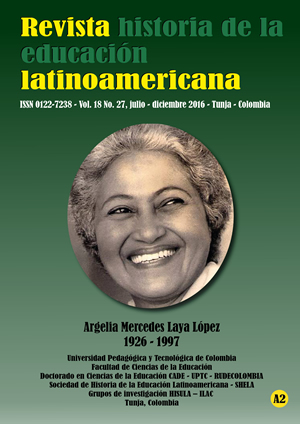Gender and construction of scientific knowledge

Abstract
The purpose of this paper is to provide an introduction on the main contributions of feminism to the construction of scientific knowledge. It is evident that not methods, but strong epistemological are necessary to deconstruct positivist approaches, in order to co-construct a science that exceeds false androcentric objectivism in favor of contextualized, inclusive and intersubjectively consensual knowledge serving as an engine for change and transformation of patriarchal power relations. The arrival of women to
the University led to a scientific revolution by incorporating their new point of view, able to detect misogynistic bias that kept them out the history by labeling them as inferior. From there, it has emerged a
real rebellion in academic epistemologies –feminist perspectives, postmodern feminists, and the empirical-
contextual ones– not specifically for the use of certain methods, but because of the strength of their shared democratic and egalitarian values.
Keywords
Gender; feminism; construction of scientific knowledge; women; University; rebellion
Author Biography
Ana Guil Bozal
Dra. en Psicología Social, Universidad de Sevilla, España, Grupo de Investigación PAIDI HUM-219 “Género y Sociedad del Conocimiento”, integrante del grupo de investigación HISULA de la Universidad Pedagógica y Tecnológica de Colombia.
References
- Arenal, Concepción. La mujer del porvenir. Alicante: Biblioteca Virtual Miguel de Cervantes, 2003.
- Bertomeu, Mª Angustias et al. Mujeres a Ciencia cierta. Material audiovisual CD-ROM interactivo. Sevilla: Instituto Andaluz de la Mujer. 2005.
- Bosch, Esperanza, Ferrer, Victoria A. y Gili, Margarita. Historia de la Misoginia. Unversitat de les Illes Balears: Anthropos, 1999.
- Collins, Patricia Hill. The Social Construction of Black Feminist Thought. Signs vol. 14, No. 4, 1989. DOI: https://doi.org/10.1086/494543
- Collins, Patricia Hill. Learning from the Outsider Within: The Sociological Significance of Black Feminist Thought, Social Problems, vol. 33, No. 6, 1986. DOI: https://doi.org/10.1525/sp.1986.33.6.03a00020
- Collins, Patricia Hill.Comment on Hekman’s “Truth and Method: Feminist Standpoint Theory Revisited”: Where’s the Power?, vol. 22, No. 2, (1997), 375-81. DOI: https://doi.org/10.1086/495162
- Chodorow, Nancy. The Reproduction of Mothering. Berkeley: University of California Press, 1978. DOI: https://doi.org/10.1525/9780520924086
- Dinnerstein, Dorothy. The mermaid and the minotaur: Sexual arrangements and human malaise. New York: Harper and Row, 1976.
- Fox Keller, Evelyn. Reflexiones sobre Género y Ciencia.Valencia: Alfons el Magnànim, 1991.
- Fox Keller, Evelyn. Feminism and Science.Signs7, No. 3, 1982.
- Flores Espínola, Artemisa. Metodología feminista: ¿una transformación de prácticas científicas? Tesis Doctoral. Madrid: Universidad Complutense, 2013.
- Gilligan, Carol. In a DifferentVoice (traduccción: La moral y la teoría: Psicología del desarrollo femenino). México: Fondo de Cultura Económica, 1985.
- González García, Marta I. Género y Conocimiento. En López Cerezo, José Antonio y Sánchez Ron, José M. eds. Ciencia, tecnología, sociedad y cultura en el cambio de siglo. Madrid: Biblioteca Nueva, OEI, 2001.
- Guil, Ana. El papel de los arquetipos en los actuales estereotipos sobre las mujeres. Comunicar Revista de Comunicación y Educación. No. 12: “Estereotipos en los medios, educar para el sentido crítico.1999.
- Guil, Ana. De la mitología al ciberfeminismo: tejedoras de redes. En: Ricardo Pérez-Amat, Sonia Núñez y Antonio García Jiménez. Eds. Comunicación, identidad y género. Madrid: Fragua. Vol. I, 2008.
- Guil, Ana. The Voice of Women Psychologist. En Ana Guil, Ana L. Comunian y Ann O.Roark, ed. Celebrating 70 years of working towards Health, Peace and Social Justice. Sevilla: Arcibeleditores 2015.
- Harding, Sandra. Ciencia y feminismo. Madrid: EdicionesMorata, 1996.
- Harding, Sandra, The instability of the Analytical Categories of Feminist Theory.1986. DOI: https://doi.org/10.1086/494270
- Harding, Sandra. A Socially Relevant Philosophy of Science?Resources from Standpoint Theory’s Controversiality, 19, No.1.Hypatia:2004. DOI: https://doi.org/10.1111/j.1527-2001.2004.tb01267.x
- Harding, Sandra.Whose Science, Who Knowledge?: Thinking from Women’s Live. 1991.
- Hartsock, Nancy C.M.The feminist standpoint: developing the ground for a specifically feminist historical materialism. En Harding, Sandra y Hintikka, Merrill, ed. Discovering reality: Feminist perspectives on Epistemology, Metaphysics, Methodology and Philosophy of Science. Holanda: Reidel Publishing Company. 1983.
- Hartsock, Nancy C M. Money, Sex, and Power: Toward a Feminist Historical Materialism. Northeastern: University Press, 1986.
- Hartsock, Nancy C M. Comment on Hekman's "Truth and Method: Feminist Standpoint Theory. Revisited": Truth or Justice?Signs.Vol. 22, No. 2.1997. DOI: https://doi.org/10.1086/495161
- Hekman, Susan. Truth and Method: Feminist Standpoint Theory Revisited. 1997. DOI: https://doi.org/10.1086/495159
- Hilary Rose, Brain Hand and Heart. A Feminist Epistemology for the Natural Sciences, Signs, vol. 9, no.1.1983. DOI: https://doi.org/10.1086/494025
- Jane, Flax, Thinking fragments: Psychoanalysis, feminism and post-modernism in the contemporary west. Berkeley: University of California Press, 1990. DOI: https://doi.org/10.1525/9780520329409
- Longino, Helen E. Subjects, power, and knowledge: description and prescription philosophies of sciences.En Alcoff, Linda y Potter, Elizabeth.ed. Feminist epistemologies. New York: Routledge. 1993.
- Longino, Helen E. Science as Social Knowledge: Values and Objectivity in Scientific Inquiry. Princeton: Princeton University Press, 1990. DOI: https://doi.org/10.1515/9780691209753
- Longino, Helen E. Gender, Politics and Theorical Virtues. SyntheseVol. 104, No. 3. 1995. DOI: https://doi.org/10.1007/BF01064506
- Longino, Helen E. How Values Can Be Good for Science. En Peter Machamer (ed). Science, values, and Objectivity. Pittsburgh: University Press, 2004).
- Pisan de, Christine. La ciudad de las damas. https://seminariolecturasfeministas.files. wordpress.com/2012/01/la-ciudad-de-las-damas-texto.pdf
- Ruddick, Sara, Maternal Thinking: Toward a Politics of Peace. Boston: Beacon, 1989).
- Smith, Dorothy. Women’s Perspective as a Radical Critique of Sociology», En: Evelyn Fox Keller y Helen Longino: Feminism & Science. Nueva York: Oxford University Press, 1997. original en Sociological Inquiry, 1974, Vol. 44, No.1.
- Smith, Dorothy. The Conceptual Practices of Power: A Feminist Sociology of Knowledge.Boston: Northeastern University Press, 1990.
- Smith, Dorothy. Comment on Hekman's “Truth and Method: Feminist Standpoint Theory Revisited. Signs, Vol. 22, No. 2.1997. DOI: https://doi.org/10.1086/495164
- de%20la%20medicina.htm
